
Some GLP-1 receptor agonists, including drugs such as Ozempic, are prescription drugs for losing weight that should only be prescribed by a doctor, the Food and Drug Administration (FDA) said yesterday, adding that 21 cases of suspected adverse reactions have been reported in the past three years.Th
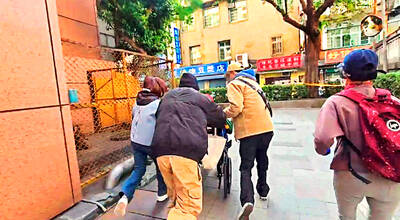
NOMINAL NEWLYWEDS: A man’s family and his wife — his long-term caregiver — are engaged in a legal dogfight over the propriety and validity of the recent union
A centenarian’s marriage to his caregiver unbeknownst to his children has prompted legal action, as the caregiver accuses the man’s children of violating her personal liberty and damaging her reputation, while the children have sought a legal option to have the marriage annulled.According to sources

One of three people killed in a car collision into an Asian specialty grocery store in the Westwood area of Los Angeles on Thursday has been confirmed as a Taiwanese citizen.The incident occurred around noon near the University of California, Los Angeles, where a 92-year-old female driver first stru
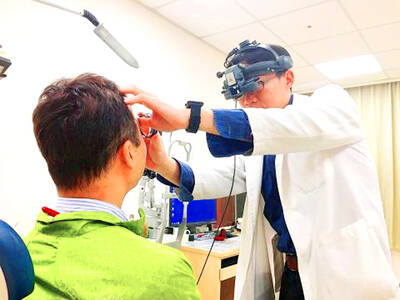
Suddenly blurred vision might be a symptom of eye stroke caused by restricted blood flow, or vasoconstriction, from low temperatures during cold weather, a doctor warned as he called on people with chronic disease or nearsightedness to be careful.Eye stroke, or retinal artery occlusion, has symptoms

Taiwan Taoyuan International Airport medical staff reminded people not to insist on flying while feeling sick, after certifying an office worker with severe flu-like symptoms as unfit to fly.The Landseed Hospital-run center said on Tuesday last week that doctors removed a woman in her 20s from her c

‘T-DOME’: IBCS would increase Taiwan’s defense capabilities, enabling air defense units to use data from any sensor system and cut reaction time, a defense official said
A defense official yesterday said that a purported new arms sale the US is assembling for Taiwan likely includes Integrated Battle Command Systems (IBCS). The anonymous official’s comments came hours after the Financial Times (FT) reported that Washington is preparing a US$20 billion arms sale encom

A joint military exercise code-named “Justice Mission 2025” carried out by the Chinese People’s Liberation Army (PLA) in December last year suggested that the PLA was testing year-round operational readiness, appears focused on aggression against Taiwan’s eastern region as well as Penghu, a Taiwanes

Taiwan must first strengthen its own national defense to deter a potential invasion by China as cross-strait tensions continue to rise, multiple European lawmakers said on Friday. In a media interview in Taipei marking the conclusion of an eight-member European parliamentary delegation’s six-day vis

BACKLASH: Actor Candy Yang said the film, about a real-life murder case, has the thrill element like seeing Sherlock Holmes and John Watson solving a crime
The production team of a new local period suspense movie, adapted from the Lin family murders on Feb. 28, 1980, yesterday apologized to the public for shooting it without consent from the victims’ family, after the film’s announcement last week caused a backlash. The producers of the film, titled Mu
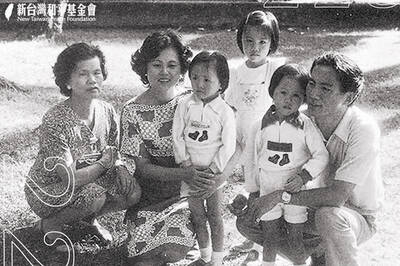
WHITE TERROR: ‘I spit at them [filmmakers] and their arrogance, which lingers on Taiwan’s wounds like a stench,’ Legislator Puma Shen said in an online post
A Democratic Progressive Party (DPP) lawmaker and a scholar yesterday slammed producers of a film about the unresolved murders of three members of democracy advocate Lin I-hsiung’s (林義雄) family, after it was discovered that producers had not sought the family’s consent before shooting the film. The
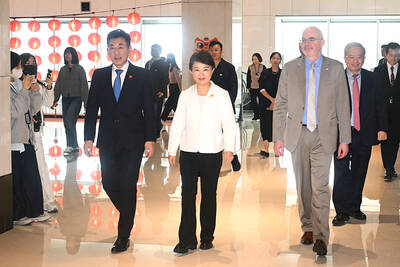
Chinese Nationalist Party (KMT) Deputy Chairman Hsiao Hsu-tsen’s (蕭旭岑) labeling of American Institute in Taiwan (AIT) Director Raymond Greene as “a small fish” in the US Department of State was not supported by heavyweights within his own party.The Cabinet’s version of the NT$1.25 trillion (US$39.5

Visitors walk under a 350m-long melon and fruit corridor — a lush, immersive walkway of fruiting plants — at the Pingtung Tropical Agriculture Expo, which opened yesterday. The event is to run through March 1.

Taipei Mayor Chiang Wan-an, second left, hands out red envelopes at the Taipei Lunar New Year Market yesterday.
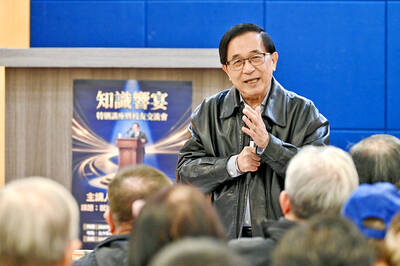
Former president Chen Shiu-bian gives a speech titled: “How Studying at Tainan First Senior High School Shaped A-Bian’s Political Career” in Taipei yesterday. Chen was invited to give a special lecture at the event hosted by the Tainan First Senior High School Alumni Association.
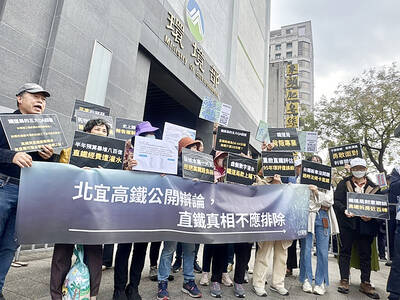
RAILWAY RECKONING: Opponents to the planned HSR extension to Yilan County filed an appeal against the impact assessment, urging reconsideration of the plan
Opponents of a plan to extend the high-speed rail (HSR) to Yilan County yesterday filed an administrative appeal against its environmental impact assessment (EIA) conclusion, while more than 200 supporters protested outside the Ministry of Environment.The Alliance Overseeing the High Speed Rail Exte
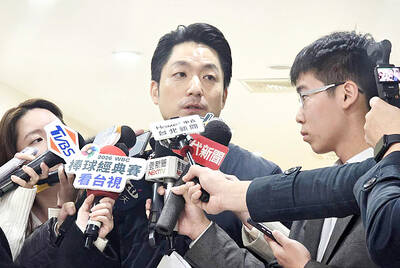
The Taipei City Government yesterday confirmed that it has negotiated a royalties of NT$12.2 billion (US$380 million) with artificial intelligence (AI) chip giant Nvidia Corp, with the earliest possible signing date set for Wednesday next week.The city has been preparing for Nvidia to build its Taiw

SAFETY AND EFFICIENCY: The subsidy, taking effect in July, would promote leasing over buying smart assistive medical devices for late-life home care
The long-term care subsidy amount is to be boosted to NT$60,000 over a three-year interval from July for each applicant who chooses to lease smart assistive devices instead of buying them, the Ministry of Health and Welfare said yesterday.The ministry is to include smart device leasing as a subsidy

The Miaoli County Industry and Commerce Development Division on Tuesday issued a five-point information bulletin in the hopes that surprise packages hoping to bring fortune and luck, or Fu Dai (福袋), would not be sprung upon the public in a bad way.Customer rights are protected under the Mandatory an
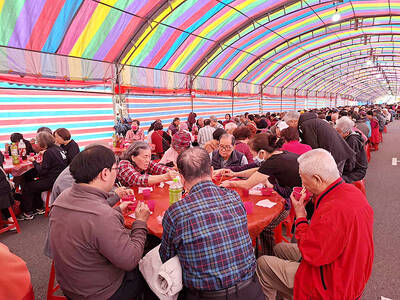
Doctors on Thursday warned that the combination of sodium, alcohol and fluctuations of sympathetic nerves from social interaction could cause a cerebral hemorrhage and urged people to drink rationally during Lunar New Year gatherings.Taipei City Hospital’s Zhongxing branch Department of Medicine and

Taipei Zoo welcomes the Lunar New Year this year through its efforts to protect an endangered species of horse native to central Asia that was once fully extinct outside of captivity.The festival ushering in the Year of the Horse would draw attention to the zoo’s four specimens of Przewalski’s horse
